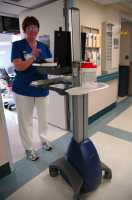Author Interviews, Electronic Records, JAMA, Outcomes & Safety / 06.11.2018
Medical Record Doesn’t Always Reflect Medications Patient Actually Taking
MedicalResearch.com Interview with:
 Timothy Ryan PhD
This work was performed while Dr. Ryan was at
Precera Biosciences, 393 Nichol Mill Lane
Frankluin, Tennessee
MedicalResearch.com: What is the background for this study? What are the main findings?
Response: The study design is quite simple. We measured medication concentrations in patients, then compared empirically detected medications with prescribed medications in each patient’s medical record. We used this information to estimate how many prescribed medications patients had actually taken and how often they took medications that were not in their medical record. The later comparison is a particularly novel measure of the number and types of medications taken by patients unbeknownst to healthcare providers who use the medical record as a guide to patient care.
Further, the test was performed in blood and not urine, so we could obtain an estimate of how often patients were in range for medications that they did take – at least for medications where the therapeutic range for blood concentrations are well established.
In sum, we found that patients do not take all of their medications, the medical records are not an accurate indicator of the medications that patients ingest, and that even when taken as prescribed, medications are often out of therapeutic range. The majority of out-of-range medications were present at subtherapeutic levels. (more…)
Timothy Ryan PhD
This work was performed while Dr. Ryan was at
Precera Biosciences, 393 Nichol Mill Lane
Frankluin, Tennessee
MedicalResearch.com: What is the background for this study? What are the main findings?
Response: The study design is quite simple. We measured medication concentrations in patients, then compared empirically detected medications with prescribed medications in each patient’s medical record. We used this information to estimate how many prescribed medications patients had actually taken and how often they took medications that were not in their medical record. The later comparison is a particularly novel measure of the number and types of medications taken by patients unbeknownst to healthcare providers who use the medical record as a guide to patient care.
Further, the test was performed in blood and not urine, so we could obtain an estimate of how often patients were in range for medications that they did take – at least for medications where the therapeutic range for blood concentrations are well established.
In sum, we found that patients do not take all of their medications, the medical records are not an accurate indicator of the medications that patients ingest, and that even when taken as prescribed, medications are often out of therapeutic range. The majority of out-of-range medications were present at subtherapeutic levels. (more…)
 Timothy Ryan PhD
This work was performed while Dr. Ryan was at
Precera Biosciences, 393 Nichol Mill Lane
Frankluin, Tennessee
MedicalResearch.com: What is the background for this study? What are the main findings?
Response: The study design is quite simple. We measured medication concentrations in patients, then compared empirically detected medications with prescribed medications in each patient’s medical record. We used this information to estimate how many prescribed medications patients had actually taken and how often they took medications that were not in their medical record. The later comparison is a particularly novel measure of the number and types of medications taken by patients unbeknownst to healthcare providers who use the medical record as a guide to patient care.
Further, the test was performed in blood and not urine, so we could obtain an estimate of how often patients were in range for medications that they did take – at least for medications where the therapeutic range for blood concentrations are well established.
In sum, we found that patients do not take all of their medications, the medical records are not an accurate indicator of the medications that patients ingest, and that even when taken as prescribed, medications are often out of therapeutic range. The majority of out-of-range medications were present at subtherapeutic levels. (more…)
Timothy Ryan PhD
This work was performed while Dr. Ryan was at
Precera Biosciences, 393 Nichol Mill Lane
Frankluin, Tennessee
MedicalResearch.com: What is the background for this study? What are the main findings?
Response: The study design is quite simple. We measured medication concentrations in patients, then compared empirically detected medications with prescribed medications in each patient’s medical record. We used this information to estimate how many prescribed medications patients had actually taken and how often they took medications that were not in their medical record. The later comparison is a particularly novel measure of the number and types of medications taken by patients unbeknownst to healthcare providers who use the medical record as a guide to patient care.
Further, the test was performed in blood and not urine, so we could obtain an estimate of how often patients were in range for medications that they did take – at least for medications where the therapeutic range for blood concentrations are well established.
In sum, we found that patients do not take all of their medications, the medical records are not an accurate indicator of the medications that patients ingest, and that even when taken as prescribed, medications are often out of therapeutic range. The majority of out-of-range medications were present at subtherapeutic levels. (more…)

